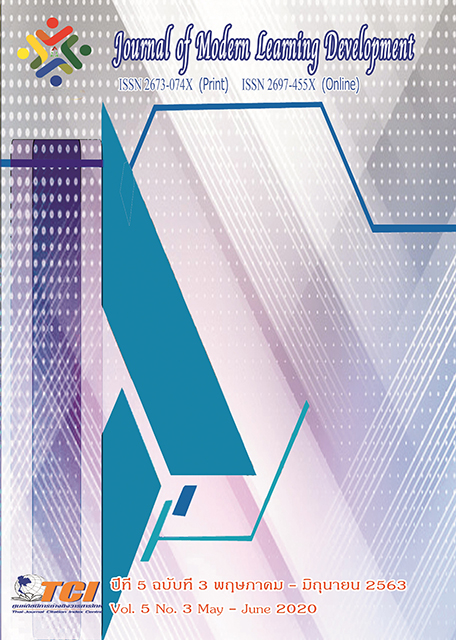Model of Floating Market Tourist Management affected to Development of Livelihoods and Culture in Thailand
Main Article Content
Abstract
The objectives of this research were as follows: 1) to study the condition and potential of the floating market in Thailand, 2) to study the policies, factors, and components of the floating market tourism management model, and 3) to study and analyze the floating market tourism management model in developing life and culture in Thailand. It is a qualitative research through in-depth interviews, surveys, content studies on the history and culture of floating markets tourism in the central region with personnel, communities, and stakeholders, and organizations related to floating markets tourism management.The data was analyzed by content analysis.
The results of the research revealed that
1.Floating markets in Thailand had flourished in the past and carried a long history. The potential of the floating market is divided into 4 areas, namely: economy, physical, ecology, and the feeling.
2.Policy, factors, and components of floating market tourism management model : Policy of floating market tourism management are 1) Rehabilitation of relations with neighboring countries for Thailand to be most important. 2) Implement proactive marketing strategies by creating tourism activities at both the domestic and international levels.3) Accelerating the development, restoration of heritage and cultural assets 4) Increase the variety of tourism. 5) Increase convenience measures Create security and prevent exploitation of tourists.
Factors of floating market tourism management are 1) Internal factors include tourism resources. 2) External factors : The political economy of the world Popular in tourism Expanding transportation routes and exchanging political policies. components of floating market tourism management( 3As) are 1) Attraction 2) Amenities 3) Accessibility.
Model of floating market tourism management are 1) tourism and activities patterns in the form of natural floating market tourism, 2) tourism and activities patterns of floating market tourism in the form of seasonal tourism, 3) tourism and activities patterns of floating market tourism in the form of developing as a learning center (Natural conservation), and 4) tourism and activities patterns in the form of In-depth natural conservation.
3.Analyzing the floating tourism market management model in the development of life and culture in Thailand in 3 forms namely : 1) Historical Tourism 2) Cultural Tourism and 3) Buddhist Tourism. Government participation in management of stakeholders, owners of floating markets, people, tourists, creating tourism network and public relations policy, policy formulation, build awareness of being a good host and showing the community identity to people in the area. Floating market administrators should promote and support local products in the community to boost up the income of the locals, analysis and make a development plan in each area with ability in undertaking tourism.
Article Details
References
กระทรวงการท่องเที่ยวและกีฬา. (2561). นโยบายด้านการท่องเที่ยวเชิงนิเวศ. ออนไลน์. สืบค้นเมื่อ 30 มกราคม 2563.แหล่งที่มา: https://www.trueplookpanya.com/blog/content/59616
เถกิงศักดิ์ ชัยชาญ. (2556). การพัฒนาคุณภาพการท่องเที่ยวเชิงนิเวศใน ภาคตะวันออกเฉียงเหนือมหาวิทยาลัยเทคโนโลยีสุรนารี. รายงานการวิจัย: นครราชสีมา.
แผนพัฒนาเศรษฐกิจสังคมแห่งชาติ. (2561). หลักการของนโยบายทางสังคม(แผนพัฒนาเศรษฐกิจสังคมแห่งชาติ ฉบับที่ 9 พ.ศ. 2545-2549). ออนไลน์. สืบค้นเมื่อ 30 มกราคม 2561. แหล่งที่มา : https://www.nesdb.go.th
พอเจตน์ เรืองกลัด. (2552). การนำแนวคิดปรัชญาเศรษฐกิจพอเพียงไปใช้ในโรงเรียนประถมศึกษา สำนักงานเขตลาดกระบัง อำเภอศรีราชา จังหวัดชลบุรี. ชลบุรี: พีดีปริ้นสโตร์
แพรดาว ฟูพาณิชย์พฤกษ์. (2559). กรอบนโยบายการพัฒนาการท่องเที่ยอย่างยั่งยืน: กรณีศึกษาเกาะช้าง จังหวัดตราด. วารสารการจัดการภาครัฐและเอกชน, 23 (1),39-64.
นิดา บัวงาม และคณะ.(2546). การจัดการตลาดน้ำวัดลำพญา จังหวัดนครปฐม. รายงานการวิจัย: นครปฐม.
วรรษมน จันทดิษฐ์. (2552). พฤติกรรมและความพึงพอใจของนักทองเที่ยวชาวไทยศึกษากรณีตลาดน้ำอัมพวา จังหวัดสมุทรสงคราม. รายงานการศึกษาอิสระ หลักสูตรบริหารธุรกิจมหาบัณฑิต. บัณฑิตวิทยาลัย: มหาวิทยาลัยกรุงเทพ.


